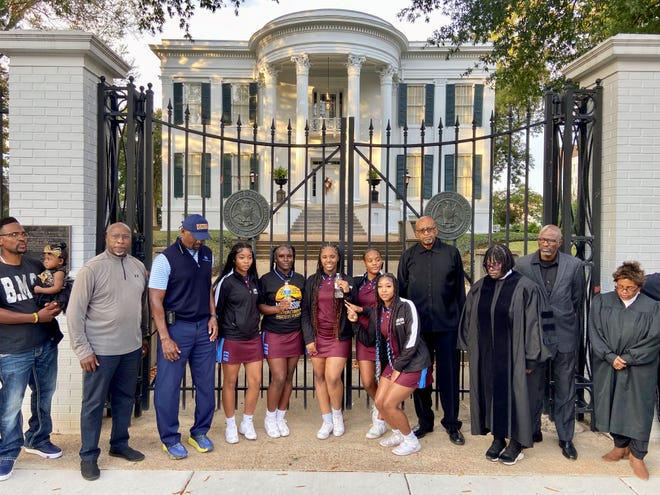
More than 200 people came out on a cool and comfortable Halloween night in front of the governor’s mansion to hear the Rev. William Barber make the case that the people of Jackson should do more to hold the State of Mississippi accountable for the water crisis that has engulfed the Capital City.
“You hold the power,” Barber told the people from the stage of the latest in a series of events that have been called Moral Mondays. “Gov. Tate Reeves won his position by less votes than the number of registered voters in Jackson who did not vote.”
This was the third Moral Monday that Barber, who is a pastor and co-chair of the Poor People’s Campaign, has presided over in Jackson. Barber said it is likely the last rally he will hold in Jackson, at least for the foreseeable future.
The estimated 200 people in attendance was down from the nearly 250 people in attendance three weeks ago but more than the first Moral Monday rally held in Jackson in September.
More: JACKSON’S WATER HISTORYJackson water crisis flows from a century of poverty, neglect and racism
More: LEAD IN WATERClarion Ledger investigation for lead in Jackson water reveals broader issues. See results
“The State of Mississippi wants you to forget. They want you to move on just like they have moved on from you,” Barber said. “Gov. Reeves has moved on. He called a special session of the Legislature this week to bring a new business to the state, but he wouldn’t call a special session to handle the water crisis that is poisoning the people of Jackson. He has moved on.”
Those who marched through Jackson to attend the event brought bottles of what they said was cloudy Jackson tap water to deliver to the front steps of the governor’s mansion.

No one from the governor’s mansion came out to acknowledge the rally or collect the bottles.
In his previous Moral Monday, Barber said he fully expected his organization to file a fair housing lawsuit against the State of Mississippi before his organization’s next rally in Jackson.
Instead, he read a letter he said had come from The Center for Constitutional Rights and Forward Justice.
In part, the letter read, “Forward Justice and the Center for Constitutional Rights proudly stand with partners at the Poor People’s Campaign of Mississippi, the Rapid Response Coalition, and Jackson community residents as they demand community-driven solutions for a fully-funded and functioning public water infrastructure. Time and time again, majority Black and Brown low-income communities are left to suffer the devastating consequences of crumbling, outdated water infrastructure. These crimes against humanity are immoral and must stop! Forward Justice and Center for Constitutional Rights are steadfastly examining all potential legal intervention. We are dedicated to standing with this community’s commitment to hold Mississippi state actors accountable for intentionally depriving resources from the Community.”

The Moral Mondays are modeled after a series of events Barber set in motion in 2013, when he called on people in North Carolina, where he was then-president of the state’s NAACP chapter, to protest many state government policies that he saw as immoral based on how they impacted low-income people, including voting rights and healthcare policies.
“The goal is to nationalize a state problem,” Barber said. “The battle for justice, in this case, for water safety in Jackson, can have national implications. The Montgomery bus boycott was a national issue, even though it was in Montgomery.”
Barber hopes the movement in Jackson will be as successful as the one in North Carolina, which he said started with 17 people. Those rallies ended with 15,000 people marching.
In a press conference earlier in the day, Jackson Mayor Choke Antar Lumumba said the The City of Jackson is in compliance with the Safe Drinking Water Act.
Lumumba said he was given the information by the Unified Command Group early Monday.
“That was certainly welcome news by the EPA,” Lumumba said. “The EPA, in conjunction with the Mississippi Department of Health performed a series of tests on our drinking water over the last several months are in and revealed that our water is, in fact, safe to drink.”
The lead and copper results, however, have not yet been released, but have been completed, according to Lumumba.
Despite that Barber said The Center for Constitutional Rights and Forward Justice will continue to push for what he called, “recognition of human rights abuses.”
“This is about the impact on people’s lives, regardless of their color,” Barber said. “This is about more than just race. There are those who are disabled and sick who cannot fight for themselves and if Gov. Reeves cannot see that, then we have a lot more to talk about than just water.”


